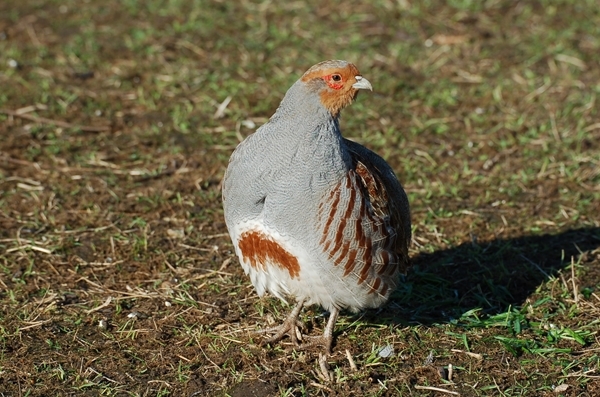
THE Cornish Grey Partridge Project (CGPP), which aims to help the recovery of the diminishing gamebird, is returning to this year’s Royal Cornwall Show.
Led by the Cornwall County Group of the Game & Wildlife Conservation Trust (GWCT), staff will be out in force to showcase the project’s ground-breaking work across the three-day event at the Showground, Wadebridge (June 7th to 9th).
Talking about the volunteer-led project will be Charlie Watson Smyth, whose farm at Tregirls on the Prideaux-Brune Estate is where the work takes place and Dave Butler from Perdix Wildlife, who provides grey partridge broods. Director of fundraising Jeremy Payne and regional organiser for the South West David Thurgood will also be on hand to answer any questions about the CGPP or any other ongoing GWCT projects.
After launching in 2016, the project aims to help reverse the rapid decline of native grey partridges in Britain. Their numbers have plummeted from millions to just over 65,000 breeding pairs of these colourful gamebirds over the past 50 years. GWCT research has shown that two factors have contributed to the downfall in numbers.
Firstly, intensification of farming has reduced the numbers of insects available in our fields, where chicks are taken to forage for food meaning that young grey partridge chicks are starving to death.
Secondly, these ground-nesting birds and their chicks are vulnerable to predators such as crows and foxes.
Specifically, Cornwall has been badly affected by this decline and had, until the start of this project, lost this species as a breeding bird.
But research by the GWCT has shown that, with the right habitat management and a careful reintroduction of birds and their protection from predation, particularly in the breeding season, populations can be restored and we are seeing possibly the start of this already on Mr Watson Smyth’s farm.
On this farm, in the autumn of 2016, the Cornwall Group released five family groups and by spring 2017 a minimum of eight breeding pairs had survived the winter.
Despite it being the wettest March since 1998 and not having three consecutive dry days since July, there were still 5 to 10 breeding pairs recorded in the spring count.
The birds will be supported through ongoing predator control, with the aim of protecting sitting hens, nests, eggs and young chicks.
“Although we’re are only two years into the project, I’m pleased with the findings so far,” said GWCT’s director of research Nick Sotherton.
“It was a difficult spring count to say the least, but things are moving in the right direction. We’re incredibly grateful to Western Power for getting behind this project and making it possible.”
GWCT's stand number this year is 801 in the Countryside Area.
For further information about the day, contact regional organiser for the South West David Thurgood on 01297 678275 or dthurgood@gwct.org.uk
Download the GWCT Grey Partridge Conservation Guide >>
Notes to editors
The Game & Wildlife Conservation Trust – providing research-led conservation for a thriving countryside. The GWCT is an independent wildlife conservation charity which has carried out scientific research into Britain’s game and wildlife since the 1930s. We advise farmers and landowners on improving wildlife habitats. We employ more than 60 post-doctoral scientists and other research staff with expertise in areas such as birds, insects, mammals, farming, fish and statistics. We undertake our own research as well as projects funded by contract and grant-aid from government and private bodies.
For information, contact:
Eleanor Williams
Telephone: 07592 025476
Email: press@gwct.org.uk